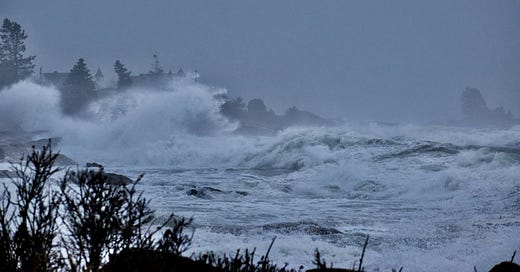"Humility" is often taken to mean "thinking less of oneself." But what it actually means is to accurately assess your place in the world.
Most of us overestimate our standing, and so humility tends to pull in the downward direction. But it is just as humble for God to point out he controls the land and seas.
Reading I
Jb 38:1, 8-11
The Lord addressed Job out of the storm and said:
Who shut within doors the sea,
when it burst forth from the womb;
when I made the clouds its garment
and thick darkness its swaddling bands?
When I set limits for it
and fastened the bar of its door,
and said: Thus far shall you come but no farther,
and here shall your proud waves be stilled!
Even with all of our modern technology, we can't control the oceans. Ships today are still lost at sea; homes are destroyed in storms. Humans have on occasion altered the coastline, but these efforts are so monumental that they're remembered centuries later.
And God is in charge of all of it.
Which is the point of the long discourse today's passage is taken from. Job demands to know why God is allowing terrible things to happen to him. And God responds by saying Job is not in a position to know or even comprehend. God's will is far beyond our understanding, as the seas are beyond our control.
Responsorial Psalm
Ps 107:23-24, 25-26, 28-29, 30-31
R. (1b) Give thanks to the Lord, his love is everlasting.
They who sailed the sea in ships,
trading on the deep waters,
These saw the works of the LORD
and his wonders in the abyss.
R. Give thanks to the Lord, his love is everlasting.
His command raised up a storm wind
which tossed its waves on high.
They mounted up to heaven; they sank to the depths;
their hearts melted away in their plight.
R. Give thanks to the Lord, his love is everlasting.
They cried to the LORD in their distress;
from their straits he rescued them,
He hushed the storm to a gentle breeze,
and the billows of the sea were stilled.
R. Give thanks to the Lord, his love is everlasting.
They rejoiced that they were calmed,
and he brought them to their desired haven.
Let them give thanks to the LORD for his kindness
and his wondrous deeds to the children of men.
R. Give thanks to the Lord, his love is everlasting.
If you’ve ever stood on the prow of a boat in the open ocean, you realize just how small you are. You don’t, however, comprehend how big the ocean is. You might think you do, since you see all the way to the horizon, but the ocean is many, many, many horizons beyond that.1
A sailor, even a modern sailor in a high-tech ship, is at the mercy of the sea. Instead of being filled with fear, however, the psalmist is filled with awe. He prays to God for help, and praises Him when that help comes.
Reading II
2 Cor 5:14-17
Brothers and sisters: The love of Christ impels us, once we have come to the conviction that one died for all; therefore, all have died. He indeed died for all, so that those who live might no longer live for themselves but for him who for their sake died and was raised.
Consequently, from now on we regard no one according to the flesh; even if we once knew Christ according to the flesh, yet now we know him so no longer. So whoever is in Christ is a new creation: the old things have passed away; behold, new things have come.
“According to the flesh” means the normal way of seeing things, with our natural senses. Jesus was a man, who was born, lived, and died; so yes, some people did see him with their own two eyes.
But faithful Christians see a new creation, as well. Jesus has remade the world, so that death isn’t the end, but only path to something new.
Alleluia
Lk 7:16
R. Alleluia, alleluia.
A great prophet has risen in our midst
God has visited his people.
R. Alleluia, alleluia.
This is the very appropriate reaction of the crowd, after Jesus performs a clear and visible miracle—raising the widow’s son to life.
Gospel
Mk 4:35-41
On that day, as evening drew on, Jesus said to his disciples: “Let us cross to the other side.”
Leaving the crowd, they took Jesus with them in the boat just as he was. And other boats were with him. A violent squall came up and waves were breaking over the boat, so that it was already filling up. Jesus was in the stern, asleep on a cushion. They woke him and said to him, “Teacher, do you not care that we are perishing?”
He woke up, rebuked the wind, and said to the sea, “Quiet! Be still!”
The wind ceased and there was great calm. Then he asked them, “Why are you terrified? Do you not yet have faith?”
They were filled with great awe and said to one another, “Who then is this whom even wind and sea obey?”
As we’ve established through the first reading and Psalm, only God can command the wind and seas. What do we see here? Jesus commanding the wind and seas.
So the answer to the disciples questions is pretty obvious: Jesus is God.2
When we’re in danger, either physically or spiritually, we have an advantage over the disciples—we already know who Jesus is. So we can reach out to Him immediately, not in fear but in faith.
At sea level, the horizon is only about 3 miles away.
This is part of where the doctrine of the Trinity comes from.



